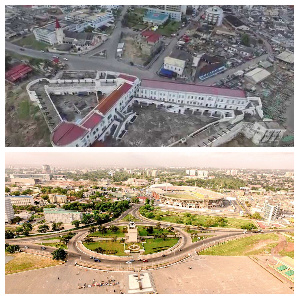It has remained one of Ghana’s most historic cities and is known for its role in the transatlantic slave trade.
Located on the coast of the Gulf of Guinea, Cape Coast, formerly called Carbo Corso (a corrupted form of “Corsican Cape”) served as the first capital of Gold Coast.
From the 16th century, many European countries established themselves in Cape Coast, using the region as a base for their operations and a trade hub for particularly slaves and other natural resources such as gold.
There were the Dutch, Portugese, Swedish and then later the British.
The architectural structure of Cape Coast was one that could be boasted of because these European inhabitants established lodges, forts and other buildings.
Cape Coast served as an important seat of Asante traders, a roadstead port and the British commercial and administrative capital.
The Cape Coast Castle which was built by the Swedish and later taken over by the British in 1663, became the government administrative seat for the Gold Coast Colony.
It also became an educational centre, with some of the first schools including the Philip Quaque Boys’ school being established there.
Cape Coast however lost its position as the first capital of the Gold Coast in 1877 when Accra became the administrative capital of the British colonial government in the Gold Coast.
During their time in Cape Coast, the British Colonial government introduced the window tax. This was a property tax suggested by the British to raise money from the indigenes.
Per the tax, every household head was supposed to pay for the number of windows in their house. It was assumed that any household that has many windows was wealthy and therefore could pay more.
This was however met by stiff opposition by the indigenes who disagreed with the basis for the tax.
After this, they moved away to create a centre of power in Accra. The seat of government was moved from Cape Coast and established in Accra.
Accra became the formal colonial administration with the Christianbourg Castle serving as the seat of government.
Accra became the economic centre of Ghana. Railways were built from Sekondi and Accra inland to Kumasi.
A municipal council was formed subsequently, to improve the town.
Accra developed into a prosperous trading hub; today it serves as the commercial and educational centre of the country.
Accra subsequently was declared a city on 29 June 1961 by Ghana’s first President Dr Kwame Nkrumah. Accra has been one of the fastest-growing cities in Africa since the pre-colonial era.
Source: www.ghanaweb.com
 Home Of Ghana News Ghana News, Entertainment And More
Home Of Ghana News Ghana News, Entertainment And More





